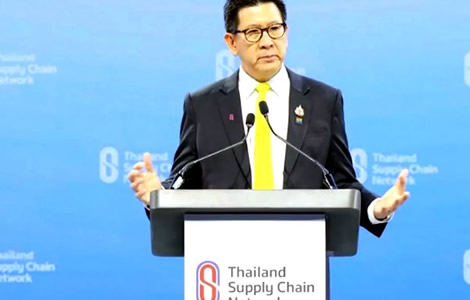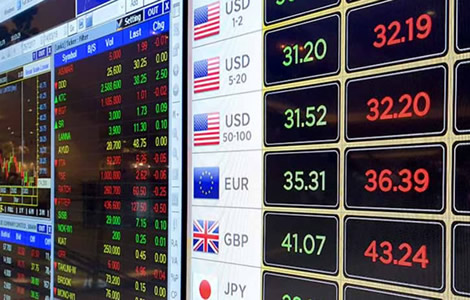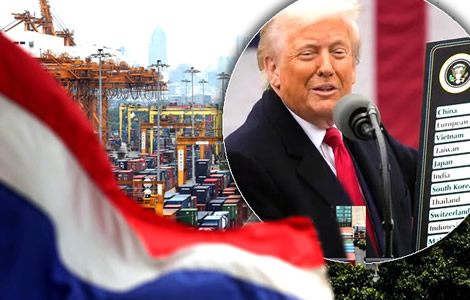Thailand’s interim government vows to boost domestic demand in Q4 2025 while managing the baht, safeguarding public finances, finalising the US trade deal, navigating a battered economy, and addressing weak growth projected at just 1.4%–1.8%.
On Saturday, new Finance Minister Ekniti Nitithanprapas warned business leaders that the world of trade is now defined by bipolar alliances. The Thai government is zeroing in on domestic demand in the final quarter of 2025 to prop up growth while racing to finalise its reciprocal trade deal with the United States. Facing a battered economy and a projected 1.4–1.5% growth rate, the interim administration is scrambling to manage the baht, safeguard public finances and avert a looming downgrade from ratings agencies.

Thailand is settling in again to a new government, its fifth since 2023, including cabinet reshuffles. For the economy, it is both good and bad news. On the one hand, new Prime Minister Anutin Charnvirakul has brought in some bright minds from the business sector and the civil service, while on the other hand, the new cabinet is a political patchwork of compromises.
Indeed, before the removal of Paetongtarn Shinawatra as Prime Minister, the economy’s prospects had begun to stabilise and indeed looked bright. Certainly, the securing of a 19% tariff deal with the United States by former Minister of Finance Pichai Chunhavajira on August 1st was seen as critical.
At the same time, the government had plans for a negative income tax in 2027, a tax amnesty for offshore income, and stronger supply chain protections for the country’s manufacturing sector, fighting a bitter battle with cheap Chinese alternatives and encroachments.
Balance of leadership and cabinet compromises while managing economic and fiscal expectations
In parallel, investors are watching movements in forex trading closely, as the baht’s volatility reflects both domestic fiscal plans and international market sentiment.
Indeed, this was the nuts and bolts of the government’s trade negotiations with the United States.
Buoyed by these hopes, the Ministry of Finance had been targeting a 2.3% GDP growth figure. In the meantime, the National Economic and Social Development Council (NESDC) suggested a range from 1.8% to 2.3%.
Since then, in addition to a change of Prime Minister and government, there have been a number of developments. One is a spike in the value of the baht. Although pared back last week, it is still up 6.4% for the year.

The reason is unclear. For instance, the Bank of Thailand is pointing to the country’s trade surplus. In particular, a 30% surge in the exports of gold to Cambodia. The fact that this has been linked to illicit operations along the Thai-Cambodian border has only added to the perplexing nature of the problem.
It is compounding an already deteriorating position with foreign tourist numbers this year. In the first eight months, the numbers were down 7.1%, with the notable exception of the European and American markets, which rose by 15% and 8%, respectively.
However, as the country heads into the tourist high season, the stronger baht, boosted by gold exports, is going to hit the economy heavily.
Gold exports and baht appreciation are weighing on tourism and trade while creating economic pressures
At the same time, the baht is also being strengthened by a tighter money supply in the kingdom. With new lending stagnant, the country’s money supply, for instance, in July only expanded by 3.6% compared to 2024. This was in stark contrast to 8.8% in China, 12.2% in India, and 6% seen in Vietnam.
Despite this, there may be some hope on the horizon with more resilient economic figures from the United States at the end of last week. The higher baht value is driven in large part by speculative capital responding to US interest rate moves.
It had already built in further US rate cuts. However, with the US Federal Reserve now suggesting a more cautious rate-cutting posture, this may help reverse the trend. In short: a stronger dollar and a weaker baht.
Nevertheless, in Bangkok, there is optimism in the financial sector about the new government. Leading analysts are still predicting the baht to hold its present position of ฿32.2 to ฿32.50 for the remainder of 2025. Indeed, after that, they suggest it may strengthen further.
Financial analysts predict the baht will hold its level while markets await changes in US interest rates
Certainly, this will be of little comfort to Thai exporters, particularly to the United States, now dealing with a 19% tariff rate and a stronger baht. Nonetheless, exporters and industry have emphasised that stability and a competitive tariff rate are all-important as they work to carve out a niche in Thailand’s largest export market.

In the meantime, exporters are working with the Ministry of Commerce to broaden the kingdom’s markets, in particular, an elusive Thai-European Union free trade deal. Talks are due to take place in Bangkok this week, focused on sustainability and the SME sector, according to Chotima Iemsawasdikul, Director-General of the Department of Trade Negotiations (DTN).
Consistent progress is being made on chapters of the pact, which is both ambitious and wide-ranging.
In the meantime, the government of Anutin Charnvirakul and new Minister of Finance Ekniti Nitithanprapas are planning practical stimulus measures to boost the economy. This may run into problems.
Exporters face tariff pressures while government plans stimulus and trade deals to support the economy
It comes after Fitch, the ratings agency, joined Moody’s in downgrading Thailand’s sovereign debt rating outlook from stable to negative. At the same time, the International Monetary Fund (IMF) has called for Thailand to rein in public debt. The world financial body wants to see it back within 60% of GDP.
Presently, that figure is running at close to 65%. Significantly, projections ahead suggest it may hit the 70% ceiling. This is set by law under the State Fiscal and Financial Disciplines Act 2018.
This has limited the new government and indeed goes against advice from world bodies in the past that the government should use fiscal policy to help the vulnerable and the poor.
In Bangkok, there is behind-the-scenes anger at the signals indicated by the downgrades. Only S&P still maintains a stable outlook. The kingdom has invested heavily in maintaining exceptional external reserves, and notably, some 99% of the government’s funding comes from domestic sources in baht.
Sovereign debt outlook and IMF advice add pressure on government fiscal policy and financial management
Nonetheless, a downgrade of the country’s debt ratings would be seen as disastrous. Some 50% of such outlook downgrades are prescient. According to the numbers, this percentage results in an actual sovereign debt downgrade within 1–2 years. Thailand presently has a BBB+ rating.
In the meantime, previous management by the former Pheu Thai-led government was more prudent. It had already declared the projected budget deficit in 2025 would come in at 4.3% compared to 4.6% in 2024.
Undoubtedly, it appears the government must find more of its budget to pay for rising public debt levels. However, the rate of 8.6% of income is still seen as manageable. Indeed, it is below the 10% ceiling, which applies to investment-grade ratings, which Thailand still maintains.
Nonetheless, Thailand’s economy cannot hope to roar back to growth comparable to its ASEAN peers without substantial structural reforms. That was previously the view of the Bank of Thailand and outgoing Bank of Thailand Governor Sethaput Suthiwartnarueput. Additionally, it is the outlook being pursued by the new central bank boss, Vitai Ratanakorn.
Chronic structural issues and inequality continue to limit Thailand’s growth prospects despite policy reforms
The kingdom has been burdened by chronic inequality and a failure to equip its workforce with high-earning capacity. The country has simultaneously been plagued by political instability for two decades. Undeniably, this has frustrated and stalled any determined efforts at reform or change.
Indeed, that can be seen from the latest government change. Previously, the Pheu Thai government, in power for two years, had been on the cusp of major changes. This was an agenda set Organisation for Economic Co-operation and Development (OECD). Certainly, a key proposal was a bold and exciting reverse income tax plan.
In the meantime, foreign tourism numbers continue to plunge, and the strong baht is impeding exports. The former projection of 1.8% to 2.3% growth has now been downgraded to 1.4% to 1.8%.
Political instability and strong baht worsen tourism and reduce economic Thai growth projections
Last Saturday, Ekniti Nitithanprapas addressed business leaders. This came at the Thailand Supply Chain Network Business Partner Conference at Sustainability Expo 2025 in central Bangkok. He warned about a shift to a bipolar trading world in which countries are forced to choose alliances.
On the one hand, he reaffirmed the country’s fiscal stimulus plans. In addition, he also outlined structural shifts and the tenets of the new interim government’s policy.
“The world used to champion tariff reductions to promote free trade, but now we’re seeing a resurgence of trade barriers. Certain goods are subject to stricter inspections,” he said. “We need to grow the economy first, but sustainably. We must also tackle inequality. That’s why the economic team has adopted a unified framework for communication and policy.”
Ekniti Nitithanprapas warns of a bipolar trading world and outlines interim government economic policy
The new minister pledged to tackle inequality while providing liquidity to small business concerns. He acknowledged the headwinds facing exports. It comes after a surge in the first half of the year due to Trump’s impending reciprocal tariffs.
Certainly, he said, the interim government would be looking to boost domestic demand towards the end of 2025. He also reasserted the government’s commitment to the Bio-Circular-Green (BCG) economy. This, notably, is a concept introduced by the government of General Prayut Chan-o-cha in 2021.
Bank of Thailand Governor plans to help 3 million distressed small loan borrowers, rolling out in 2026
At the same time, the new Ministry of Commerce, Suphajee Suthumpun, on Thursday, had an assurance for the media. She emphasised that work was proceeding on the US-Thai trade pact or reciprocal tariff deal unveiled on August 1st. Certainly, as Thailand’s largest and most profitable export market, it remains central to any economic plan moving forward.
Join the Thai News forum, follow Thai Examiner on Facebook here
Receive all our stories as they come out on Telegram here
Follow Thai Examiner here
Further reading:
Dark days ahead for the economy despite a 1.8% GDP gain with ominous warning signs on employment
Concern for US tariff deal as new Thai government shows enthusiasm for stronger links with Beijing
Thailand’s once mighty tourism industry is failing but now faces further damage from overvalued baht


















